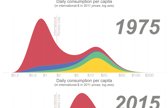

‘It’s crazy, but I started my own bank’: the story behind Starling. Oakland, CA to launch large-scale UBI experiment. After encouraging preliminary results from Stockton’s universal basic income (UBI) experiment, another California city is testing out guaranteed income as a strategy for economic empowerment for marginalized groups.
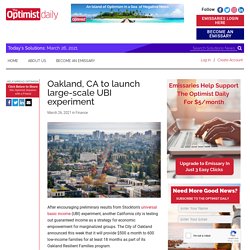
The City of Oakland announced this week that it will provide $500 a month to 600 low-income families for at least 18 months as part of its Oakland Resilient Families program. As with other UBI programs, the families will have complete autonomy over how and when they use the money, but researchers will record how the funds are spent and the corresponding effects on participants’ lives. The participating families will be randomly drawn from a pool of eligible Black, Indigenous, and other people of color (BIPOC) families whose income is at or below 50 percent of the area median income, or about $59,000 for a family of three.
Generation Z characteristics and its implications for companies. See our latest research on Gen Z in America and Gen Z in Asia.
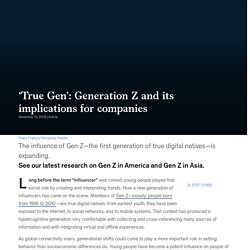
Long before the term “influencer” was coined, young people played that social role by creating and interpreting trends. Now a new generation of influencers has come on the scene. Members of Gen Z—loosely, people born from 1995 to 2010—are true digital natives: from earliest youth, they have been exposed to the internet, to social networks, and to mobile systems. That context has produced a hypercognitive generation very comfortable with collecting and cross-referencing many sources of information and with integrating virtual and offline experiences. As global connectivity soars, generational shifts could come to play a more important role in setting behavior than socioeconomic differences do.
Our study based on the survey reveals four core Gen Z behaviors, all anchored in one element: this generation’s search for truth. Such behaviors influence the way Gen Zers view consumption and their relationships with brands. How Gen Z will change the workforce — Quartz at Work. Employees have traditionally been the ones who have to grovel to get—and sometimes, to keep—a job.
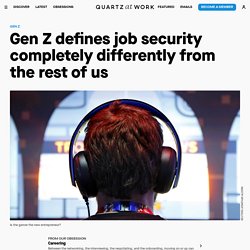
But as Generation Z starts to enter the workforce, that power dynamic is due for a shift. At least that’s what Google’s chief education evangelist Jaime Casap believes: Gen Z will be the ones to fix the broken workplace structure. UBI Success: Updates from the case study in Stockton, CA. Back in 2019, we shared how Stockton, California was launching the country’s first universal basic income (UBI) experiment.
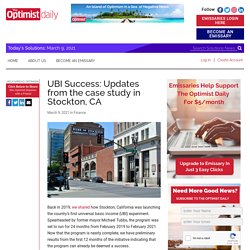
Spearheaded by former mayor Michael Tubbs, the program was set to run for 24 months from February 2019 to February 2021. Now that the program is nearly complete, we have preliminary results from the first 12 months of the initiative indicating that the program can already be deemed a success. Decades of progress on extreme poverty now in reverse due to Covid. Two decades of progress in the reduction of extreme poverty, the elimination of which is one of the sustainable development goals, have been pushed into a sharp reverse by a combination of the impact of the Covid-19 pandemic, the growing climate emergency and increasing debt.
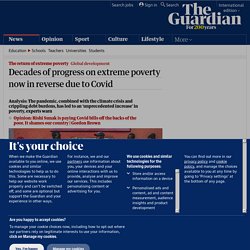
With the World Bank warning of a “truly unprecedented increase” in levels of poverty this year, and renewing calls for debt forgiveness, experts are warning of a growing crisis in multiple areas from education to employment, likely to be felt for years to come. While the World Bank was already pessimistic, in January it updated its forecast for the expected number of newly impoverished people this year from between 88 and 115 million to the new range of between 119 and 124 million. Global poverty has seen a spectacular decline since the 1960s – when about 80% of the world’s population lived in extreme poverty. “We had worked on the hypothesis that this group would be more resilient. And that has not been in the case. Dasgupta_Review_-_Full_Report.pdf. Economics' failure over destruction of nature presents ‘extreme risks’
The world is being put at “extreme risk” by the failure of economics to take account of the rapid depletion of the natural world and needs to find new measures of success to avoid a catastrophic breakdown, a landmark review has concluded.
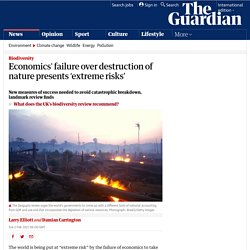
Prosperity was coming at a “devastating cost” to the ecosystems that provide humanity with food, water and clean air, said Prof Sir Partha Dasgupta, the Cambridge University economist who conducted the review. Radical global changes to production, consumption, finance and education were urgently needed, he said. The cost of de-globalising world trade: Economic scenarios for the world’s turn inwards - The Economist Intelligence Unit (EIU) Covid crisis is fuelling food price rises for world's poorest.
Over the last year, Covid-19 has undone the economic, health and food security of millions, pushing as many as 150 million people into extreme poverty.
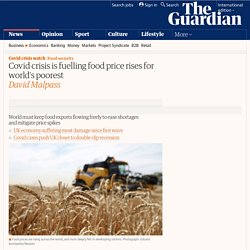
While the health and economic impacts of the pandemic have been devastating, the rise in hunger has been one of its most tangible symptoms. Income losses have translated into less money in people’s pockets to buy food while market and supply disruptions due to movement restrictions have created local shortages and higher prices, especially for perishable food. World economy in 2021: here's who will win and who will lose. The coronavirus has crippled the world economy.
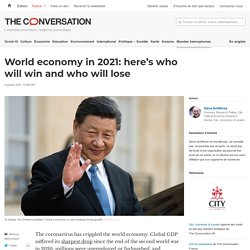
Global GDP suffered its sharpest drop since the end of the second world war in 2020, millions were unemployed or furloughed, and governments pumped trillions of dollars into their economies to prevent greater damage. Nevertheless, a 2021 recovery is very uncertain. China’s economy is growing strongly again, but many of the world’s richest nations may not fully rebound until 2022 at the earliest. Inequality is also rampant. While America’s 651 billionaires have increased their net worth by 30% to US$4 trillion, a quarter of a billion people in developing countries could face absolute poverty, and up to half the global workforce may have lost their livelihoods. What is the future? I was chatting with a friend the other day, who pointed out my predictions.
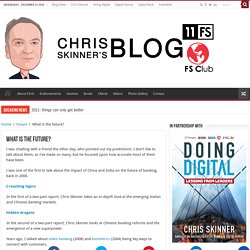
I don’t like to talk about them, as I’ve made so many, but he focused upon how accurate most of them have been. I was one of the first to talk about the impact of China and India on the future of banking, back in 2006. Crouching tigers In the first of a two-part report, Chris Skinner takes an in-depth look at the emerging Indian and Chinese banking markets. Why the Covid economic crisis has hit poorer nations less deeply than feared. Last March, when Covid-19 infected the world economy, many observers feared that emerging markets and developing countries would suffer the most, financially and otherwise.
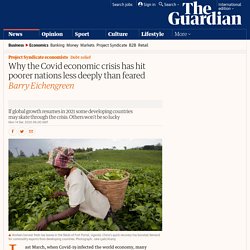
Economically, they relied on commodity exports, remittances, and tourism, all of which fell through the floor with the pandemic. There was every reason to expect a tsunami of financial crises and debt defaults. The tsunami never arrived. Shocking inequality: why San Francisco voted for 'overpaid executive tax' The “extreme, shocking inequality” he and the other 900,000 residents are forced to navigate every day led Haney, a member of the San Francisco Board of Supervisors, the city’s legislative body, to propose a new “overpaid executive tax” designed to help tackle the problem. Many of the biggest and best-known US companies would easily fall into the highest bracket. For example, Elon Musk, the chief executive of Tesla and the world’s third richest person, was paid $595m (£449m) last year, almost 10,000 times the firm’s median salary of just under $60,000.
Tim Cook, the chief executive of Apple, was paid $134m in 2019, more than 2,300 times the firm’s median pay of $57,600. At Google’s parent company, Alphabet, Sundar Pichai’s $86m was only 350 times the median of $246,804. Unlike Tesla and Apple, Alphabet does not operate high street stores, which brings down average pay. Do Direct Cash Transfers Work? – BRINK – News and Insights on Global Risk. A passerby gives money to a person who identifies as homeless on a sidewalk in New York City. A study suggests that cash transfers could be an effective approach to reduce homelessness. Photo: Spencer Platt/Getty Images The concept of direct cash transfers has become widely discussed by economists during this economic recession.
One study in Canada gave a single cash transfer to homeless people in Vancouver and followed their spending habits for a year. Moral Money. Universal basic income is the answer to the inequalities exposed by COVID-19. Rule number one of crisis management: When you find yourself in a hole, first, stop digging. In the COVID-19 outbreak frenzy, several countries are considering massive fiscal stimulus packages and printing money, to blunt the concurrent crises underway: the pandemic and the unraveling economic depression. Universal Basic Income in China. The Universal Basic Income (UBI) Forum. 50 homeless people in Canada were given over $5,000 each. Here’s what happened next. Canada’s New Leaf project is an innovative of tackling homelessness. The COVID-19 pandemic’s impact has worsened, and been exacerbated by, social inequalities. Cash transfers can help by providing direct and urgent access to capital.
This study gave homeless people $5,660 each. The results are beautiful. Finland sees promising results after nationwide experiment with universal basic income. Is COVID-19 Accelerating a Shift of Service Jobs to the Developing World? – BRINK – News and Insights on Global Risk. Staff work at a call center in Hyderabad. Covid-19 has changed working patterns for good, UK survey finds.
Most office workers do not intend to spend five days a week in the workplace once the Covid-19 crisis is over, with both bosses and employees seeing home working as a long-term trend.. From plague to penury - The pandemic is plunging millions back into extreme poverty. Visualizing the $88 Trillion World Economy in One Chart. World Bank: Covid-19 pushes poorer nations 'from recession to depression' What does Indonesia's upcoming election mean for the country's politics? Lagos's poor lament Covid fallout: 'we don't see the virus, we see suffering' When the banks closed, no-one cared. A great headline posted in The Financial Times the other day: When the banks closed in Wuhan, nobody cared The Financial Times article makes clear how advanced the Chinese economy is today. For several months this year, banks across Hubei province, an area home to 60 million people, shut their doors to retail customers. Covid-19 to send almost all G20 countries into a recession - Economist Intelligence Unit.
Digital Banking for the Poor. Coping with Covid19 – Supply Chains and the Butterfly Effect. Coronavirus: from lockdown to bailout oh, and the issue of financial exclusion. World Bank warns Covid-19 pandemic risks dramatic rise in poverty. Lives vs lives – the global cost of lockdown. What does the #coronavirus crisis mean for #FinTech? Rebottling the Gini: why this headline measure of inequality misses everything that matters. Bruce Boghosian Publishes on Unequal Wealth Distribution - AUA Newsroom. How Mein Grundeinkommen's basic income raffle changes lives. (29) How 3D printing will transform mass production.
How Can Asia’s ‘Miracle Economies’ Be Replicated? Capitalism done right: a co-operative system to solve human problems. Inequality: is it rising, and can we reverse it? The diversity of financial technologies. Blame Economists for the Mess We’re In. Globalisation as we know it will not survive Trump. And that’s a good thing. Refashioning clothing’s environmental impact. Global Economic Inequality. Iwp report feb 2019 final. The next crash: why the world is unprepared for the economic dangers ahead. McKinsey: Influence of family businesses rising globally. Nobel Economist Says Inequality is Destroying Democratic Capitalism. Upscaling Upcycling. GII 2018 Full print.WEB (1) If capitalism is broken, maybe it’s fixable - Open Future. 2019 Airbnb Statistics - User & Market Growth Data [Updated]
105 Amazing Airbnb Statistics and Facts (2019) The new left economics: how a network of thinkers is transforming capitalism. Are legacy companies holding back the future? Rote vs. Meaningful Learning. Rote v meaning. Rote Learning vs. Meaningful Learning. The Epic Battle: Direct Instruction vs. Discovery Learning. The west must avoid falling into the trap that stifled Japan. Great Ideas Are Getting Harder to Find. Crazy rich Asia risks running into trouble. S focus too little on what people really care about - Free exchange: The worth of nations. World Poverty is NOT Decreasing. Is the world really getting poorer? A response by Steve Pinker. Bill Gates says poverty is decreasing. He couldn’t be more wrong. On the Politics of Basic Income. Association of Professional Futurists. Seven ways to think like a 21st century economist. Periodic table to highlight scarcity of elements used in mobile phones.
Indonesia binges on e-commerce - Island shopping. U.S. economy could slip from top spot in 2020 and keep slipping, analysts say.